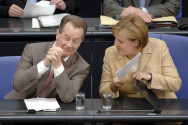In early 2005 French and Dutch voters rejected the EU constitution in referendums. The constitutional process was halted, while the heads of state and government of the EU took time out to reconsider. Now action is once again called for.
Over the last six months, the German Presidency has set itself the Herculean task of devising a road map for the new constitutional process. Before elections for the European Parliament are held in 2009 a new common basis is to be in place. A new treaty is to prevent gridlock within the EU, even with 27 or more member states.
Good chances for a road map
 Photo: REGIERUNGonline/Bergmann
Photo: REGIERUNGonline/Bergmann
The Chancellor asked members of the Bundestag to accept the fact that she was not able to make any firm statements on matters that were still to be discussed in Brussels. It is, however, already clear at this stage that, "We have good chances of agreeing on a road map," she maintained.
She hinted at one possible compromise - a reform of the European treaties in the form of a modified treaty. This would retain the substance of the draft constitution, while taking account of the fears of many citizens of Europe that a "superstate" might emerge.
All 27 countries already agree that the constitutional treaty should not include any symbols or insignia that would give the EU an image comparable to that of a state.
Who should have how many votes?
In the government declaration, the Chancellor touched on one of the thorniest issues: the future voting system in the EU. This question is the subject of much discussion in Poland in particular. "No solution is yet in sight," said Merkel.
The draft constitution provided for a system of double majority voting, according to which decisions would be adopted if 55 percent of member states representing at least 65 percent of the EU population were in favour.
Another point on which there is still no consensus is the division of responsibility between the EU on the one hand and the member states on the other. For the Chancellor and the German EU Presidency the focus must be on avoiding gridlock.
"After two years to reflect and six months of in-depth discussions, it is time to take a great step forwards," said Merkel. "If we do not manage, it does not mean the end of Europe." But, the EU would have to cope with serious consequences, the Chancellor warned.
Positive evaluation of the Presidency
In the last months a great deal has been achieved, said Merkel. Nobody today would talk about Europe stagnating. There is instead a new feeling that member states are closing ranks to take decisive action.
The results of the Germany Presidency are "nothing to be ashamed of," according to the Chancellor – from reduced costs of cross-border mobile phone calls to improved consumer protection for borrowers and the strengthening of competitiveness across the EU. The Schengen Agreement too has been extended and the Euro currency zone expanded.
Pointing the way forward together
Taking the example of climate protection, Merkel illustrated the importance of having a unified and resolute Europe. Without the agreement reached at the European Council meeting in March, the "enormous progress" made on climate protection at the G8 summit in Heiligendamm would have been quite unthinkable, according to the Chancellor.
>> Climate protection: Results of the G8 summit
Alongside the industrialised states, the major emerging economies too must in future accept greater responsibility for climate protection. The Chancellor underlined the importance of the cooperation arrangements agreed in Heiligendamm with these outreach states. The so-called Heiligendamm process provides for the G8 entering into a constructive dialogue with Brazil, China, India, Mexico and South Africa over the next two years, about issues of central importance for the global economy.
>> Heiligendamm Process
Successful G8 summit
Merkel outlined the other decisions of the G8. The summit reaffirmed the G8's huge commitment to the future of Africa, for example. Pledges to increase official development assistance (ODA) were confirmed. Germany, for instance, will be raising the funds it allocates to development cooperation by 3 billion euros by 2011.
>> Africa: Commitments will be honoured
The Chancellor reiterated her proposal to use innovative financing instruments to mobilise additional funds for development cooperation. She can, for example, happily visualise auctioning off CO2 emission reduction certificates and using the revenue for climate protection projects in developing countries.
Until very recently, many observers would have considered this and other successful outcomes impossible, Merkel reminded her audience. The Chancellor is convinced that it is largely thanks to Europe that they have been achieved. "Together, we Europeans can advance our causes in the world."